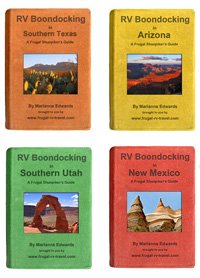Here are some random snippets on boondocking. Or perhaps you prefer to call it dry camping.
As we have traveled along, we have used traditional campgrounds, membership parks, state and national parks, quick overnight stops and boondocking. It is fun and interesting to dry camp, especially out west, without connections.
Our coach is equipped with a generator and fresh water and holding tanks that enable us to dry camp for at least a week.
 |
NEW! Boondockers Welcome (10% off with our link and discount code UrRVLifestyle10OFF)
is a great website that helps you connect with other RVers who have a location for you to dry
camp for the night, find places across the country and learn from other
RVers. Check it out.
A few thoughts on boondocking:
- Sometimes there really “ain’t no such thing as a free lunch”.
For instance, the Walmart parking lot may not charge a camping fee, but
running the air conditioner off the generator for 5 hours burns about
$10 worth of diesel in our motorhome. We can be pretty frugal, but in
the midst of summer temps approaching 100 F, the motorhome can turn into
a giant toaster oven. It is just not an option to “stick it out” for
the entire night without air conditioning. Ideally, you can find a
free camping spot with electrical hookups, such we found in Blue Earth, Minnesota. But these sort of boondocking spots are few and far between.
- Another point to bear in mind when selecting a free camping spot
is how far away it will be from the places you want to visit. Again, the
high cost of fuel may be a factor. A campground closer to the places
you plan to visit may, in the long run, be cheaper than a free parking
place that is miles away. And as you make your choices, don’t forget
about travel distances to run errands such as going into a town for
groceries, internet access, laundry facilities, etc.
- Buy plastic or paper plates, cups, utensils to
minimize your use of water. In general, conserve water. When you
first try dry camping, this means pay attention to every drop of water
you are using. Don’t let the water run while you brush your teeth or
wash up. Dishes should be wiped with a paper towel to remove food
before they are washed. And so on.
- If you are boondocking for any
length of time, you need to consider how much fresh water you have and
where you are going to find your next supply of decent water. But you
also need to consider where you are putting the water you use, and
manage according to the capacity of your holding tanks.
- Plan meals that are easy to make and clean-up. Perhaps you can live off
pre-packaged meals that can just be reheated, and then the containers
disposed of with no clean-up. If you are not a fan of frozen dinners
or other store-bought dishes, then try to plan meals (and maybe cook
things ahead of time) that can be easily reheated stovetop, or in the
microwave (using the generator). Another option is to just stick to
cold dishes. Or eat out. In any case, when you are boondocking avoid using a lot of pots and dishes that will need to be washed.
|
|
- To this point, if you have an RV with slides, you
will probably make a habit of considering what things are blocked when
the slides are in. If you want to boondock, or even stop for lunch
while enroute, will you have access to what you need? Pay attention
to which kitchen cabinets will be blocked off with slides in. If
there are things you might need (utensils, pot holders, food, spices,
dishes, etc.), move them before you head out. Do the same check in
bedroom, bath, living areas.
- Save battery power when boondocking. Look for
hidden drains on batteries. For instance, we have a Hurricane Heater
that provides instant hot water.The heater would regularly cycle on and off,which was an unnecessary drain on the house batteries (as well as using diesel).So now we leave it off until we need it or are hooked up to shore power.
Please don’t assume your hot water system works the same. Read the
specs for your RV to determine the appropriate ways you can conserve
power. Different RVs have different operating systems, components and
configurations.
We bought a couple solar panels for two purposes.
- One, we knew we would be storing our coach without hookups for over a
month and wanted to make sure the batteries would take care of the
phantom loads on our coach. In our coach, these phantom loads consist
of a number of things that run in the background. Examples include
engine and transmission ECMs (electronic control modules), LEDs, the
electronics for the refrigerator and other things we probably are not
even aware of.
- Different RVs will have their own nuances. We bought our
solar panels from AM Solar in Eugene, Oregon – two AM 100 panels (rated
at 100 watts each) with a HPV-30 charge controller. We have AGM house
batteries.
- Two, we wanted another source of power for boondocking.
Especially in places like sunny Arizona, the solar panels keep
the bateries charged. In the evening, we then have enough
battery power for lights and for the invertor to provide power
to the TV, satellite dish, computer, cell phone and camera
battery chargers, water heater, etc.
- We seldom use the
batteries/invertor to run heavy draws like the microwave and
coffeemaker. But the solar power gives us enough juice to
reduce our generator usage. And with some advance meal
planning and instant coffee, we can minimize use of the
generator even more. And of course power management is a lot easier if
you are in a climate where you don’t need to use air condiioning or
electric heat.
Frugal Shunpicker’s Boondocking Guides: Enjoy the freedom to camp off the grid, amidst the best nature
has to offer and save money too.
In many areas of North America,
including the most scenic states (Texas, New Mexico, Arizona, Utah,
California, and Colorado) there are still plenty of free, scenic, legal,
and safe camping areas.
These RV publications tell you where to find these places, so you can enjoy the wonderful experience of boondocking.
A popular boondocking spot is Quartzsite, Arizona.
And our favorite for a quick overnight is Wal-Mart. Be sure the
specific Wal-Mart allows overnight parking, spend a few bucks in the
store and be discreet and courteous.

Jill Miller is the founder of Your RV Lifestyle. Trading corporate America for the open road, Jill, along with her partner Jose, began their RV journey, making an unconventional start by wintering in New Jersey. A natural adventurer, she was motivated by a desire to explore the USA and beyond, embracing the varied landscapes, communities, and cultures across the country.
For Jill, the allure of RV living was not about material accumulation, but rather the pursuit of an adventurous, fulfilling lifestyle. A lover of golf, bicycling, hiking, and line dancing, she has carried her passions across the country, engaging with them in diverse settings. Jill’s commitment to the RV lifestyle came after years of careful research, numerous consultations with RV owners, and personal trials, including living in a rental RV.



